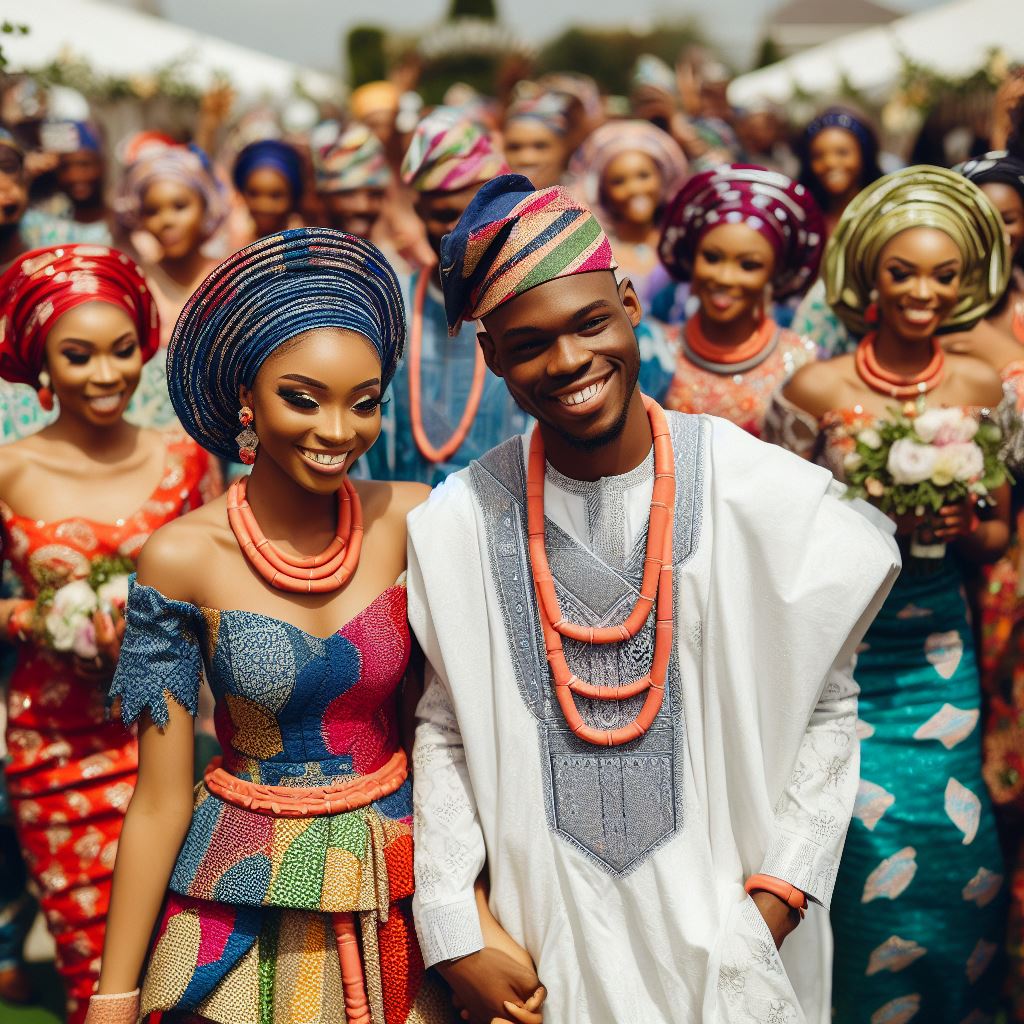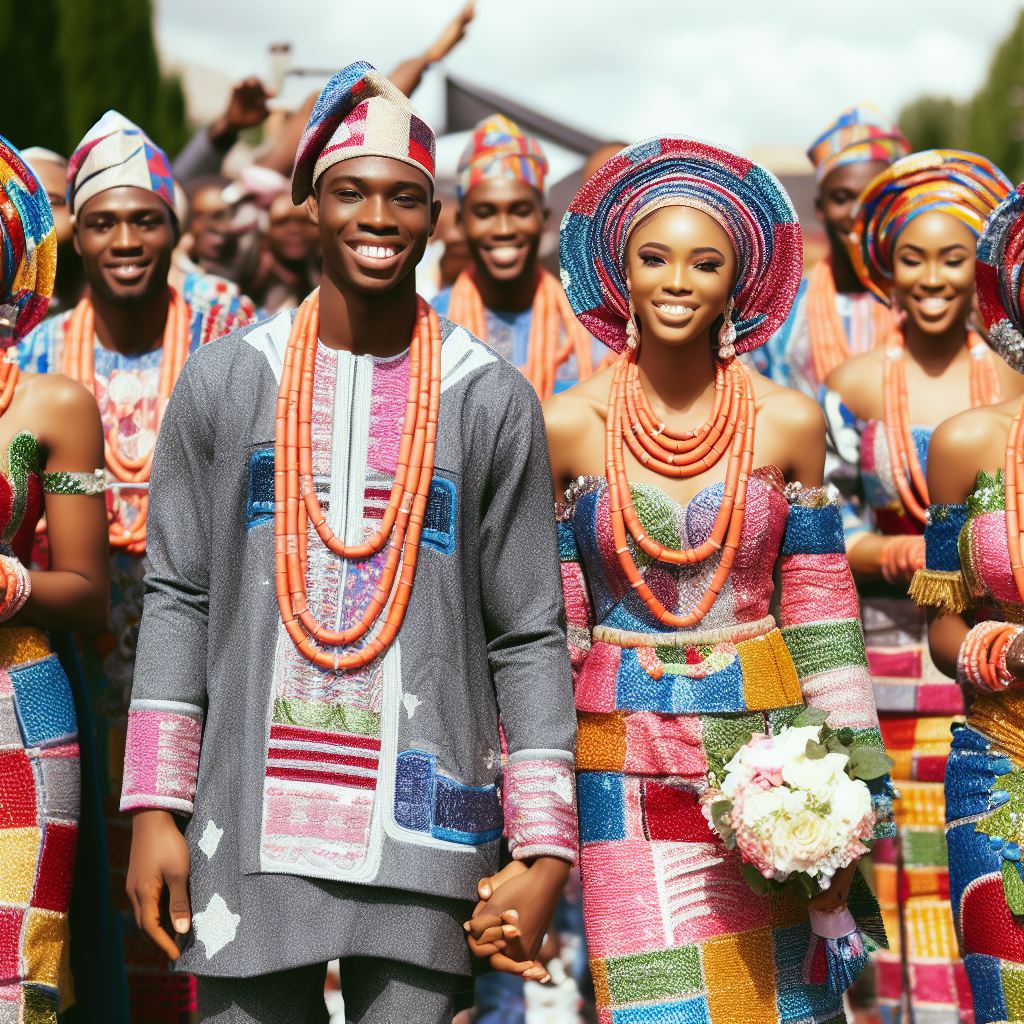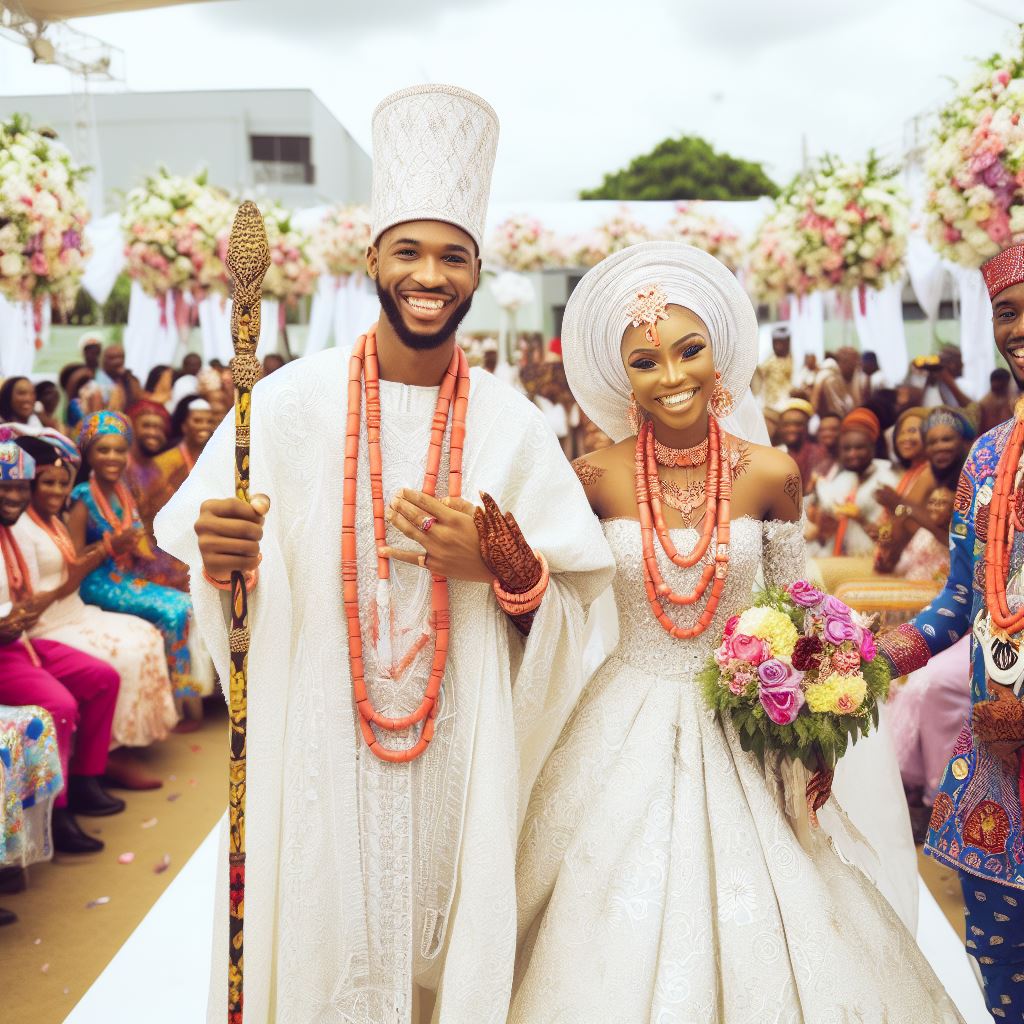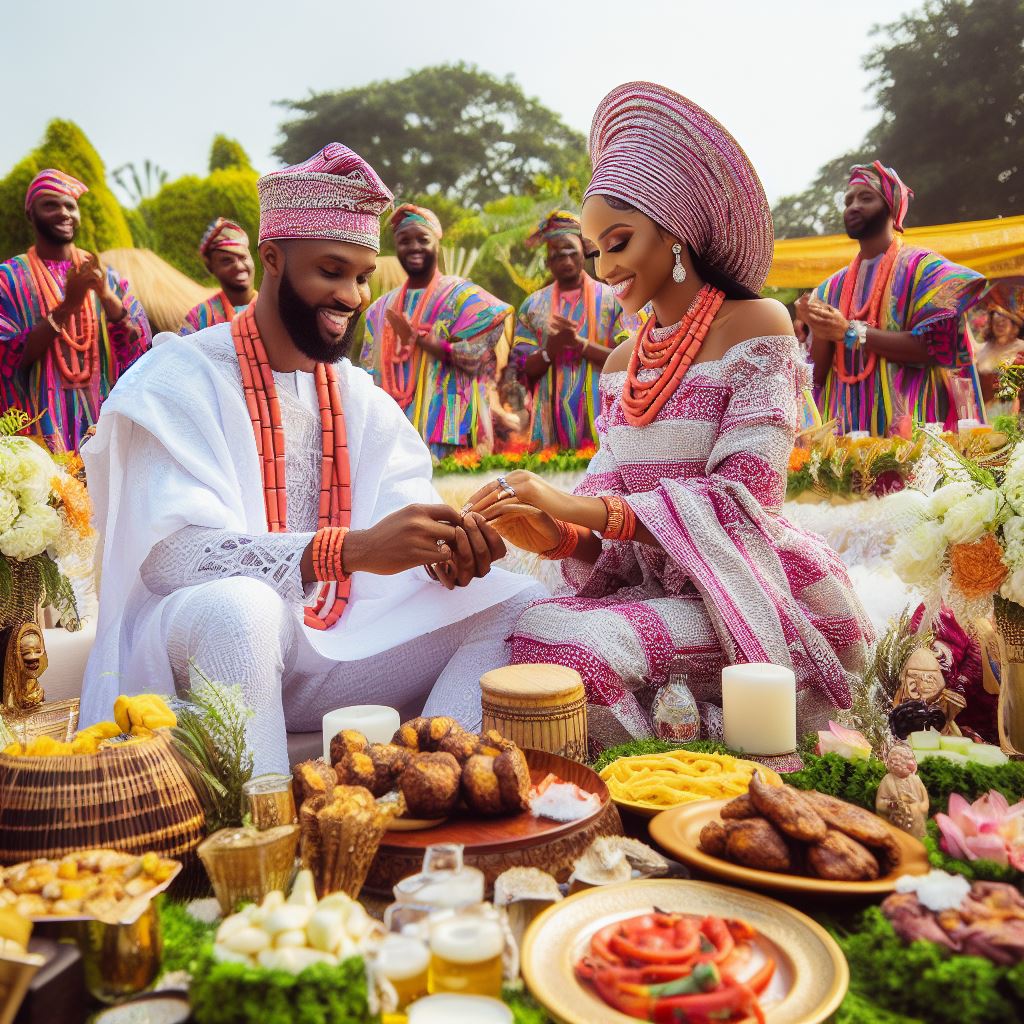Introduction
Marriage in Nigeria is a pivotal aspect of Nigerian culture and society
Marriage in Nigeria is a crucial aspect of Nigerian culture and society, serving as a cornerstone for traditional values.
Religion plays an active role in shaping the institution of marriage. In this diverse nation, various religious beliefs coexist.
Christianity, Islam, and indigenous religions influence the way marriages are conducted and perceived. These faiths offer unique perspectives on the sacred union.
Christian weddings are often grand celebrations in churches, emphasizing commitment, love, and faith in God.
Islamic marriages follow strict Sharia laws, emphasizing obedience to God’s will and the importance of family.
Indigenous religious beliefs bring their customs, tying the union to ancestral spirits and traditions.
The role of religion in Nigerian marriages goes beyond ceremony; it shapes societal norms and expectations.
Religion serves as a guiding force, reinforcing the sanctity and importance of marriage in Nigerian culture.
Religion plays a significant role in shaping and defining marriage practices in Nigeria
General Religion plays a significant role in shaping and defining marriage practices in Nigeria in several ways:
- Ceremonial Variations: Different faiths – Christianity, Islam, and indigenous beliefs – result in diverse wedding rituals.
- Christian Influence: Christian weddings often occur in churches, focusing on love and faith rooted in Christian values.
- Islamic Traditions: Islamic marriages adhere to Sharia laws, prioritizing obedience to God’s will and family values.
- Indigenous Customs: Indigenous beliefs link unions to ancestral spirits and rich cultural traditions.
- Social Norms: Beyond the ceremony, religion deeply influences societal norms, family expectations, and marital roles.
- Sanctity of Marriage: These faiths emphasize the sacredness of marriage, shaping the essence of matrimony in Nigeria.
In Nigeria, religion isn’t just a spiritual practice; it’s a powerful force that guides and defines the institution of marriage.
An overview of how religion influences the definition of marriage in Nigeria and its societal impact.
Religion significantly shapes marriage in Nigeria and profoundly impacts society in the following ways:
- Ceremonial Diversity: Religious beliefs result in diverse wedding customs, from Christian church ceremonies to Islamic unions.
- Christian Emphasis: Christian weddings prioritize love, faith, and commitment, reflecting Christian values.
- Islamic Traditions: Islamic marriages adhere to Sharia laws, underscoring obedience to God’s will and family bonds.
- Indigenous Influence: Indigenous beliefs link unions to ancestral spirits, heritage, and cultural practices.
- Social Norms: Religion goes beyond ceremonies, influencing societal norms, family expectations, and gender roles.
- Sanctity of Marriage: Faiths underscore the sacred nature of marriage, reinforcing its significance in Nigerian culture.
Religion is a defining force in Nigerian matrimony, shaping not only the ceremony but also the fabric of society.
Historical Background of Religion in Nigeria
Introduction of Islam and Christianity to Nigeria
The introduction of Islam to Nigeria can be traced back to the 11th century through trade routes.
Christianity, on the other hand, was introduced in Nigeria in the 15th century by Portuguese explorers.
Influence of colonizers on religious practices
During the colonial era, both Islam and Christianity gained prominence due to the influence of the British.
The British colonization led to the spread of Christianity and the establishment of Christian schools.
Diverse religious landscape in Nigeria
Nigeria is known for its religious diversity, with Islam and Christianity being the dominant religions.
Other religious beliefs in Nigeria include traditional African religions and various indigenous practices.
The diversity of religions has contributed to the complex nature of defining marriage in Nigeria.
Overview of Marriage in Nigeria
Traditional Nigerian Marriage Customs
Traditional Nigerian marriages are deeply rooted in cultural customs and practices.
These customs often vary across the different ethnic groups in the country. For instance, the Yoruba, Igbo, and Hausa have distinct marriage customs and traditions.
Marriage in Nigeria is typically seen as a union between families, not just individuals.
Importance of Marriage in Nigerian Culture and Society
Marriage holds great significance in Nigerian culture and society. It is considered a rite of passage and a way to ensure the continuation of the family lineage.
Marriage also plays a crucial role in establishing social status and building alliances. It is seen as a means to strengthen communal ties and foster unity among ethnic groups.
Legal Aspects and Relevant Laws Related to Marriage in Nigeria
In Nigeria, marriage is both a cultural and legal institution. The legal aspects of marriage are governed by various laws, including the Marriage Act.
Under Nigerian law, marriage must be registered for it to be recognized as valid. The marriage age in Nigeria is 18, although certain ethnic groups may have different customs.
Furthermore, polygamy is permitted in many Nigerian societies, subject to certain conditions.
For example, a man must have the means to provide for multiple wives and seek their consent.
Marriage in Nigeria is a complex and multifaceted institution that combines cultural traditions, societal norms, and legal regulations.
Understanding the various aspects of marriage is crucial for comprehending its role in defining societal values and the institution of family in Nigeria.
From traditional customs to legal frameworks, Nigeria’s diverse ethnic groups contribute to the richness and diversity of marriage practices in the country.
Acknowledging these customs while engaging with the legal aspects ensures a comprehensive understanding of the role religion plays in defining marriage in Nigeria.
Read: Nollywood Movies: Perfect for an Anniversary Date Night
Role of Religion in Defining Marriage
Major Religious Groups in Nigeria: Christianity and Islam
- Nigeria is home to two major religions: Christianity and Islam.
- Christianity is practiced by a large number of Nigerians, with various denominations.
- Islam is also widely followed by a significant portion of the population.
How Religion Shapes the Definition and Perception of Marriage
- Religion plays a crucial role in shaping the definition and perception of marriage in Nigeria.
- For Christians, marriage is considered a sacred union ordained by God.
- They believe it should be a lifelong commitment between a man and a woman.
- Islam also holds marriage to be a sacred institution, emphasizing the importance of family values.
- Both religions advocate for fidelity, companionship, and mutual support as key aspects of marital life.
Religious Ceremonies and Rituals Associated with Marriage in Nigeria
- Christian marriages in Nigeria often involve a church wedding ceremony and traditional customs.
- The religious ceremony includes prayers, scripture readings, and the exchange of vows.
- Traditional customs may include the payment of dowry, bridal processions, and feasting.
- Islamic marriages, on the other hand, involve a ceremony conducted by an Imam and the signing of a marriage contract.
- The ceremony is typically followed by a reception where family and friends gather to celebrate the newly married couple.
- In both Christianity and Islam, the involvement of religious leaders and the recitation of prayers signify the religious significance of the union.
In general, religion plays a significant role in defining marriage in Nigeria.
Both Christianity and Islam provide moral guidelines and principles that shape the perception of marriage as a sacred institution.
The religious ceremonies and rituals associated with marriage further emphasize the importance of religious values and customs.
It is through the lens of religion that Nigerians understand and define the institution of marriage, making it an integral part of their cultural and social fabric.
Read: Rekindling the Flame: Passionate Prayers for Nigerian Anniversaries
The Influence of Religion on Marriage Customs and Practices
The differences in marriage customs between Christian and Muslim communities
- Christian communities often have traditional church weddings, while Muslim communities have Islamic wedding ceremonies.
- In Christian weddings, the couple exchanges vows in the presence of a priest or pastor.
- Muslim weddings involve the recitation of Quranic verses, a marriage contract, and the payment of a dowry.
- Christian weddings often include the exchange of rings and the pronouncement of the couple as husband and wife.
- Muslim weddings commonly include a religious sermon, the signing of the marriage contract, and the celebration of a feast.
The religious requirements and obligations that impact marital practices
- Christianity emphasizes the importance of monogamy, forbidding divorce except in cases of infidelity or abuse.
- Islam allows polygamy under certain conditions, giving men the right to marry up to four wives.
- Both religions require the couple to adhere to a set of moral and ethical principles within their marriage.
- Christianity promotes fidelity, love, and mutual respect as essential components of a successful marriage.
- Islam emphasizes the husband’s responsibility to provide for his wife and children and the wife’s duty to honor and obey her husband.
Role of religious leaders in guiding and enforcing marriage norms
- Religious leaders play a significant role in counseling couples before marriage to ensure their readiness for commitment.
- Christian pastors and priests provide pre-marital counseling sessions, discussing topics like communication and conflict resolution.
- Muslim imams offer guidance on Islamic marital rights and obligations, emphasizing the importance of a healthy and respectful relationship.
- Religious leaders also have the authority to officiate weddings, legally binding couples in the eyes of their faith community.
- In cases of marital disputes, religious leaders offer guidance and mediation to help resolve conflicts and maintain family harmony.
In the end, religion has a profound influence on marriage customs and practices in Nigeria.
The differences between Christian and Muslim communities are evident in their wedding ceremonies and marital requirements.
While Christianity promotes monogamy and emphasizes love and fidelity, Islam allows polygamy under certain conditions and highlights the husband’s responsibility to provide for his family.
Religious leaders also play a vital role in guiding and enforcing marriage norms, offering pre-marital counseling and aiding in conflict resolution.
Overall, religion shapes the institution of marriage in Nigeria, shaping the values and expectations of couples and their communities.
Read: Celebrating Marital Bliss: A Compilation of Nigerian Anniversary Prayers
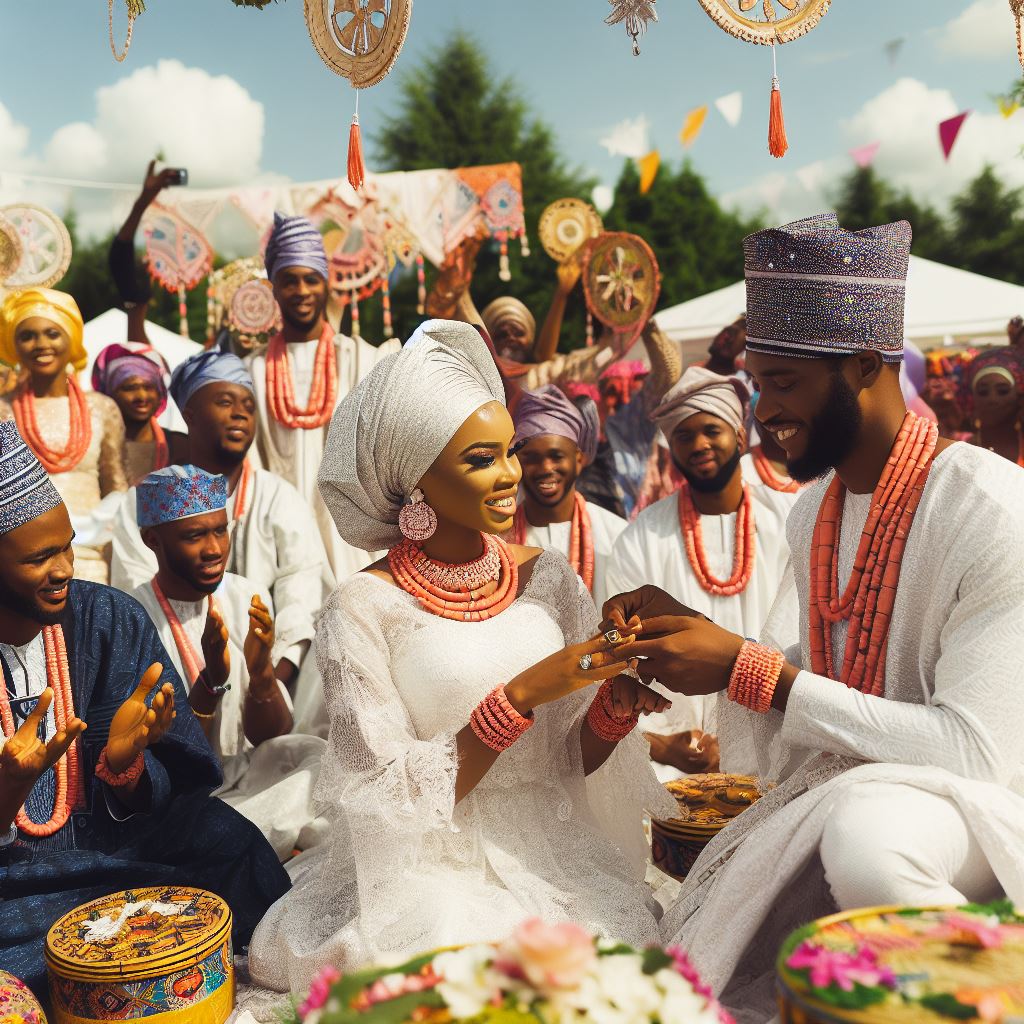
Controversial Issues and Challenges within Religious Definitions of Marriage
The issue of polygamy and its differing acceptance within religious communities
- Polygamy, the practice of having multiple spouses, is a controversial issue within religious communities in Nigeria.
- Some religious groups, such as certain Muslim sects, allow and even encourage polygamous marriages.
- These communities believe that polygamy is based on religious teachings and is a legitimate form of marriage.
- However, other religious groups, like some Christian denominations, strongly condemn polygamy as contrary to their beliefs.
- These communities argue that marriage should be monogamous and based on the principles of love and commitment.
- The acceptance or rejection of polygamy within religious communities often leads to heated debates and disagreements.
The role of arranged marriages and the influence of religion on marital choice
- Arranged marriages, where families play a significant role in selecting a spouse, are still prevalent in many religious communities in Nigeria.
- Religion often plays a crucial role in guiding the decision-making process of arranged marriages.
- Families may seek potential partners who share the same religious beliefs and values to ensure compatibility.
- The influence of religion on marital choice can be seen in the emphasis on finding a partner who will uphold religious traditions and practices.
- However, not all religious individuals or communities prioritize arranged marriages, and some allow for personal choice and preferences.
- The tension between traditional arranged marriages and modern ideas of autonomy and individuality persists within religious contexts.
Controversies surrounding interfaith marriages and religious conversions
- Interfaith marriages, where partners belong to different religious traditions, often face challenges and controversies in Nigeria.
- Religious differences can lead to conflicts regarding religious practices, family traditions, and raising children.
- Some religious communities strongly discourage interfaith marriages, fearing the dilution or abandonment of their own faith.
- Conversion may bridge religious gaps but can also spark tension among individuals, their families, or religious communities.
- While conversion bridges religious gaps, it can cause tension among individuals, families, or religious communities.
- The controversies surrounding interfaith marriages highlight the complexities and challenges of navigating religious differences within marriage.
Basically, the role of religion in defining marriage in Nigeria is not without its controversies and challenges.
These issues spark debates and shape individual choices, demonstrating the significant influence of religion on the institution of marriage in Nigeria.
Read: Essential Tips for Strengthening Marriages in Nigeria
The Impact of Religion on Gender Roles and Family Dynamics
Religion plays a central role in defining marriage in Nigeria and influencing societal norms. One of the most significant impacts of religion is seen in gender roles within the Nigerian marital context.
Religious Beliefs and Nigerian Marital Context
Religious beliefs heavily influence gender roles in Nigerian marriages.
These beliefs often prescribe specific roles and responsibilities for husbands and wives.
For instance, Christianity emphasizes male leadership within the family, while Islam emphasizes submission and obedience of wives to their husbands.
Nigerian culture deeply embeds these gender roles, shaping expectations and behaviors within marriages.
People often use religious teachings to justify and reinforce gender roles.
This practice can create a power imbalance, as men are perceived as household heads making major decisions.
Religion’s impact on gender roles reflects in various aspects of Nigerian marriages, including household chores, child-rearing, and financial obligations.
These roles are often rigid and based on traditional interpretations of religious scriptures.
Religion and Family Structures
Religion also plays a significant role in shaping family structures, responsibilities, and decision-making.
The family considers the father as its head, having the final say in all matters.
Religious leaders’ guidance holds importance in the extended family system, influenced by religion.
Religion also shapes responsibility distribution, with men primarily providing financially and women managing household tasks and childcare.
Religious beliefs influence decision-making, granting husbands the final authority in crucial family decisions.
Gender Inequality and the Role of Religion
Despite the evolving role of religion, issues of gender inequality persist within Nigerian marriages.
While some religious leaders advocate for a more egalitarian approach, traditional interpretations of religious teachings continue to perpetuate gender inequities.
This creates tensions between adhering to religious beliefs and promoting gender equality.
However, there are also instances where religion has been used to challenge gender inequality.
Some religious groups have actively worked towards promoting gender equality within the marital context.
They reinterpret religious scriptures to emphasize the importance of mutual respect, shared decision-making, and equal partnership between husbands and wives.
These progressive interpretations offer an alternative to the traditional gender roles imposed by religion.
In a nutshell, the impact of religion on gender roles and family dynamics in Nigeria is substantial.
Religious beliefs shape expectations and behaviors within marriages, influencing gender roles and family structures.
While some religious teachings reinforce gender inequality, others challenge traditional norms and promote gender equality.
It is essential to recognize and address the evolving role of religion in order to foster more balanced and equitable marriages in Nigeria.
Conclusion
The role of religion in defining marriage in Nigeria
Religion in Nigeria wields immense influence in shaping and defining marriage practices, ingrained deeply in societal norms.
Christianity, Islam, and indigenous beliefs each impart unique customs and values to matrimonial ceremonies.
Christian weddings, often held in churches, celebrate love, faith, and commitment within a Christian context.
Islamic marriages follow Sharia laws, emphasizing obedience to God’s will and the importance of family bonds.
Indigenous beliefs tie unions to ancestral spirits and cherished cultural traditions.
Beyond rituals, religion molds societal expectations, gender roles, and family dynamics.
Religion underscores the sanctity of marriage, reinforcing its vital role in Nigerian culture and society.
In summary, religion in Nigeria is a defining force, impacting the very essence of matrimony, and preserving tradition.
The Profound Significance of Religion in Nigerian Society
Religion holds immense significance in Nigerian society, shaping cultural, moral, and social values deeply.
Christianity, Islam, and indigenous beliefs form the foundation of daily life, influencing rituals, traditions, and customs.
The dominance of religion extends beyond worship, influencing family dynamics, education, and societal norms.
Religious leaders often play a pivotal role in guiding communities and advocating for moral standards.
Religion is a cohesive force, fostering a sense of belonging and shared identity among Nigerians.
In times of crisis or celebration, faith unites communities, offering solace and strength.
The influence of religion transcends generations, preserving heritage, and instilling a strong moral compass in Nigerian society.
In short, religion in Nigeria is not just a belief system; it is a way of life, a guiding principle, and an integral part of Nigerian society.
A closing thought regarding the future of marriage in Nigeria’s religious landscape
As we reflect on the profound influence of religion on marriage in Nigeria, it’s essential to envision a harmonious future.
Nigeria’s diverse religious landscape can foster unity by promoting interfaith understanding, tolerance, and respect.
Encourage educational initiatives and interfaith dialogues to bridge religious divides and foster a more inclusive society.
The future of marriage in Nigeria should celebrate the rich tapestry of beliefs while upholding fundamental human rights and gender equality.
Religious leaders can play a pivotal role in promoting peaceful coexistence and ensuring that faith does not hinder societal progress.
let’s strive for a future where love, commitment, and understanding transcend religious boundaries, enriching the institution of marriage.

